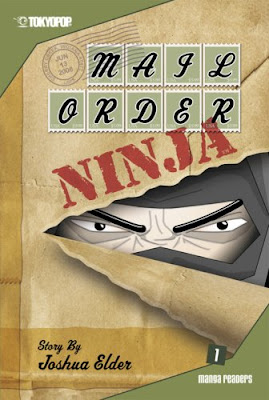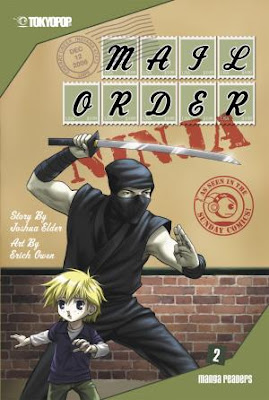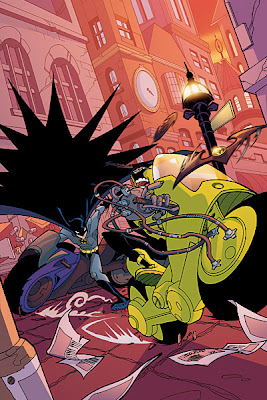The first three chapters of Scott Chantler's really excellent Canadian historical adventure series, Northwest Passage [Oni Press] was recently collected into a beautiful hardcover book. Now he's made the trip from Waterloo, Ontario to Halifax for the Word on the Street festival. I did a Q&A with Scott earlier this week, and now I'm sharing it with you guys.
 Q: Are there more installments of Northwest Passage on the way? If so, how many more volumes can we expect?
Q: Are there more installments of Northwest Passage on the way? If so, how many more volumes can we expect?
A: I intend Northwest Passage to be something I return to throughout my career. The story that's collected in the new hardcover was definitely always intended as "season one"...there at least three of four further stories I have in mind for these characters. That said, I'm in no rush to get them out. This first story took two years to complete, and I was eager to step away from it for a while. There a few other projects I want to get to, but there WILL be more Northwest Passage in the future...I just can't tell you precisely when to expect it.
Q: Northwest Passage is an ambitious undertaking! Canadian history is not a popular subject for comic books, or even adventure books in general. What inspired you to write this story, and how much history research was involved?
A: Thanks to Chester Brown's LOUIS RIEL, and my work, Canadian history seems to be becoming a more popular subject every day. But when I first pitched Northwest Passage a few years back, RIEL wasn't out yet, so there was really nothing even remotely like what I was trying to do. Oni Press deserves a lot of credit for having the nerve to take it on. I was first inspired to write something set against Canadian frontier history when I first read Peter C. Newman's COMPANY OF ADVENTURERS and CAESARS OF THE WILDERNESS (the first two parts of his history of the Hudson's Bay Company,) maybe six or seven years ago. I just thought it would make an outstanding setting for an adventure story, and couldn't believe it hadn't been more utilized in that regard. The research was pretty extensive. I had the groundwork with Newman's books, but also devoured as many other sources as I could, books on everything from everyday life at the fur trading posts, to the methods of Cree medicine men, to the history of privateering in Canada. Not to mention websites, old paintings and drawings, museum displays, you name it. Fortunately, I enjoy that part of it. One of the reasons my career has gravitated to historical stories is because I like the process of discovering and learning about new people, places, and times.
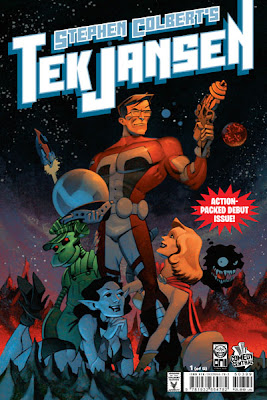 Q: How did you get involved with Tek Jansen? What has that been like, in comparison with your previous work? (I read in your blog that Stephen Colbert didn't like your original sketch of him).
Q: How did you get involved with Tek Jansen? What has that been like, in comparison with your previous work? (I read in your blog that Stephen Colbert didn't like your original sketch of him).
People ask me all the time how I got the Tek Jansen gig, and I wish there was a more fascinating answer, but it's really so simple and boring: they called and asked me to do it. I think the guys at Oni Press really wanted to use such a high-profile project to reward some of the people who'd been kicking around there for a while, and I had done five books for them and just come of Northwest Passage. Plus, I think they thought my art style and my "animated" sense of timing would make a good fit for the project. While it was definitely different from the comics work I'd done previously (which was all my personal, creator-owned stuff,) it wasn't really an adjustment to having please a licensor. I do a tonne of commercial illustration work--which is what allows me to take such chances with my choices of comics projects--so I'm used to tailoring a job to a client's wishes. That's how you have to think of these work-for-hire, licensed books...as a job. Might be a really FUN job, but in the end it's somebody else's book, not yours.
Q: Are there issues planned beyond #3 in the Tek Jansen series? If so, will you be involved?
It's planned as a five-issue miniseries. My work actually won't appear beyond the first issue...while it was a great gig to be involved with, I've just had too many offers lately, on my own projects, to have been able to stick with it.
Q: Were you doing cons promoting Tek Jansen at all? What was fan reaction like? Are the fans of that comic different from other comic fans? Lately there have been a few releases that I like to call 'gateway comics' (ie - Marvel's Dark Tower and Anita Blake comics, Dark Horse's Buffy Season 8, and the Tek Jansen series) that seem to attract fans that normally don't read comics. Do you feel that Oni viewed this project as one that might attract new comic readers?
Oni views EVERY project as one that might attract new comic readers. I don't know that there's any publisher in the business who does more to grow the audience. I've done a few shows and signings since Tek hit the stands. It's a little weird to have people coming up who clearly don't know me or my work from a bushel of potatoes...but it helps bring their attention to my creator-owned books. A fan who comes to get their Tek Jansen comic signed might be convinced to pick up a copy of Northwest Passage, too, which is nice.
Q: Were you a fan of Stephen Colbert when you were asked to work on the comic? Were you familiar with his space hero alter-ego?
Yes, I'd been a fan of Colbert's since The Daily Show first started airing in Canada. And while we began work on the comic before the animated Tek Jansen segments began airing on the show, I was always kept aware of what was going on, in terms of being able to see the model sheets and other concept work.
Q: Do you have any other projects you are working on? I know you are working on the relaunch of Hawaiian Dick...
Hawaiian Dick is being relaunched in November as a montly series, with rotating artists. I'm the artist on the first four issues. Other than that, I'm going to be doing two new original graphic novels (both of which I'll be writing) for major publishers. One is something intensely personal, the other something crazy and fun. But that's all I can tell you for now.
 Q: You are one of the rare triple threats in the comic industry who pencils, inks and writes. Do you prefer to work this way, or do you enjoy working with other authors and/or artists?
Q: You are one of the rare triple threats in the comic industry who pencils, inks and writes. Do you prefer to work this way, or do you enjoy working with other authors and/or artists?
If it's something personal, like Northwest Passage was, I like to do it all myself. I want my hands--and my hands only--on the wheel, and that's the only way to be sure to get it. But I've also really enjoyed the collaborations I've had with others. All of the writers I've worked with have been easygoing, talented, and open to letting me collaborate on the storytelling, which I think is essential. Plus it's just nice to sometimes have someone else to bounce ideas off of, or joke around with...being an auter, while giving you the ability to completely indulge yourself creatively, can be lonely work.
Q: I guess I should ask why you have decided to come to Halifax to participate in the Word on the Street festival. Do you enjoy participating in comic and writers festivals like this one?
I come because they keep inviting me! Plus, I really think the presence of comics and graphic novels at mainstream literary festivals in the last few years has been a blessing--especially for people like myself, whose work isn't in the capes-and-tights vein. Anything that exposes mainstream readers to the diversity and quality of what's being done in comics can only be a good thing...again, it grows the audience. This is the just the kind of festival I like doing the most.
Q: I believe you've been here before. Any thoughts about Halifax? (People here love hearing nice things about Halifax).
My first time in Halifax was Word on the Street last year, in 2006, and I had a blast. Great city, good times, friendly people. I was so glad when the asked me back again.
Q: I'm curious to know if you have any thoughts on the separation of comic book writers from other authors. For example, at this festival J. Torres, Darywn Cooke and yourself are all listed in a subcategory called 'cartoonists,' apart from 'authors,' even though you are all authors. I'm trying to form a question out of this, but all I can come up with is: any thoughts about the status of the comic book writer in the world of authors?
I have no problem at all with the term "cartoonist." It implies someone who writes with pictures, which is a pretty apt description of what I do. I don't think it's meant derisively...at least I don't take it that way. In fact, I think the presence of cartoonists at Word on the Street is a good sign that the literary community has come to (correctly) regard comic and graphic novels as a form of visual literacy.
 Q: What does the success of smaller comic publishers such as Oni Press mean for comic creators in terms of what they can offer that larger publishers can't?
Q: What does the success of smaller comic publishers such as Oni Press mean for comic creators in terms of what they can offer that larger publishers can't?
Mostly what they offer is freedom. If you want to do your thing, Marvel Comics and DC Comics are not going to let you do that. They want you to draw Spider-man, or Superman, and conform to the editorial direction for those characters, as dictated by the corporations who own them. With a company like Oni, you've got an operation that's run by three guys, which has a lot more opportunity and desire to take risks. Like, say, publishing a story set in Canadian frontier history.
What's been interesting in the last few years is that smaller companies like Oni have been just as successful selling their books in Hollywood as the bigger publishers with more recognizable characters have been. So while the immediate pay-off isn't as great at the smaller companies, there's still the promise of big-time financial rewards.
Q: How do you regard the importance of all-ages comics, and do you feel there are enough being made? (Northwest Passage, for example, could be distributed in schools, but it certainly could have been written with a lot of gore and sex and profanity and still have earned rave reviews, but would have cut out the younger audience). Did you take the younger demographic into consideration when you were writing Northwest Passage, or are you just not a sex and violence kind of guy?
All-ages comics are incredibly important. One of the reasons the '90s was such a dark time in this industry was because comics were so eager to prove themselves as edgy adult reading material that very few people seemed concerned about where the next generation of readers was going to come from. Obviously, that was pretty short-sighted. What's great about the industry as it is today is that there really is something for every age and taste. That's why I think the current buzz around comics and graphic novels is more than just a fad...there are enough good books, and talented creators, to be able to more than hold the public interest.
There's a considerable amount of violence in Northwest Passage, but I tried as much as possible to keep it off-panel, or implied. It wasn't out of consideration for any kind of demographic...I just prefer that sort of Hitchcock-ian style of storytelling, where you make the audience work a bit. You could never show them anything as terrifying as what they can conjure in their own mind.
Q: It seems that more Canadians are making a name for themselves in the comic book industry than ever before. Certainly Toronto has a very strong comic scene, and Halifax has a nice little one for our size. Do you feel that it's a good time to be a Canadian comic creator?
It's a great time. I think Canadians have a distinct voice, and that the industry is becoming more accommodating of distinct voices. You can barely walk down the street in Toronto without bumping into a phenomenally talented comics creator. It's such a great thing to be a part of.
Q: How important is it, to you, for Canadian creators to tell Canadian stories? Obviously Northwest Passage is a Great Canadian history lesson, and has done well in the States. Do you intend to continue to work on books with Canadian themes?
Northwest Passage sells best in Canada, but it does better in the States than anyone had a right to expect. Stong reviews have helped, including prominent reviews in Entertainment Weekly and Publishers Weekly. And it's a big word-of-mouth book. It gets a big boost from blogs, message boards, people giving copies to friends, etc.
I think Canadians are hungry for Canadian stories. It's natural, with the amount of U.S. media we digest, to assume that all stories are set in New York. But when something comes along that's a little more recognizable to us, I think there's a real connection. Something I tried to do with Northwest Passage was to tap into a mythic Canadian landscape. What I've depicted isn't really what northern Manitoba looks like, really...but I didn't want that, anyway. What I wanted was what Canadians see when they close their eyes and think of Canada.
Q: What comics are you reading and excited about right now?
I've been reading my way through Paul Grist's Kane, which I just discovered a couple of years ago but absolutely love. I think Grist may be the most interesting storyteller in comics, currently. There's a European series called Belladone, historical adventure stuff with cartooning which makes wildly jealous. But I don't get as much time to read as I'd like...I'm too busy these days creating my own stuff.
Thanks to Scott Chantler for taking the time to answer my questions!
If anyone local is reading this, come on down to Word on the Street tomorrow! It's free and there are a lot of great writers and artists who will be there. I'll be conducting the Degrassi panel at 1:15 with J. Torres, Ramon Perez and actor Mike Lobel (Jay Hogart from Degrassi The Next Generation). There will also be an 11:15 Q&A with J. Torres on writing for comics, a 3:15 Q&A with Scott Chantler on historical comics, and a 4:15 panel with Darwyn Cooke and Steve McNiven on storytelling and comics. All of these creators, and more, will be available for signings and sketches at various times throughout the day. There's no reason to miss this, and every reason to go!
 Jeff Parker is one of my favourite comic writers because you can tell that he really enjoys his job. He has written (and drawn!) an impressive pile of comics that are all full of action, fun, humour and are often appropriate for all ages. He is best known for his awesome work at Marvel, including Agents of Atlas, X-Men First Class, Marvel Adventures Avengers, Exiles, The Age of The Sentry, and Spider-Man and The Fantastic Four. One of his newest projects, however, is and original creation for DC's Wildstorm imprint. Mysterius the Unfathomable is a great new six-issue series that falls into the "supernatural detective" genre, and has amazing art by Tom Fowler. Issue #4 hits stores today, and I highly recommend checking out the whole series if you haven't yet.
Jeff Parker is one of my favourite comic writers because you can tell that he really enjoys his job. He has written (and drawn!) an impressive pile of comics that are all full of action, fun, humour and are often appropriate for all ages. He is best known for his awesome work at Marvel, including Agents of Atlas, X-Men First Class, Marvel Adventures Avengers, Exiles, The Age of The Sentry, and Spider-Man and The Fantastic Four. One of his newest projects, however, is and original creation for DC's Wildstorm imprint. Mysterius the Unfathomable is a great new six-issue series that falls into the "supernatural detective" genre, and has amazing art by Tom Fowler. Issue #4 hits stores today, and I highly recommend checking out the whole series if you haven't yet.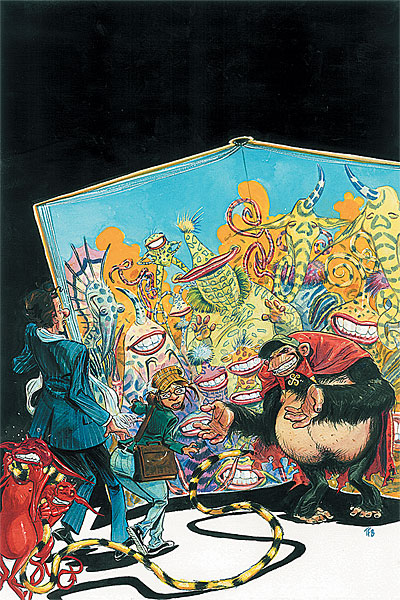 I'd like to start with you describing the concept of Mysterius the Unfathomable in your own words and where the inspiration came from.
I'd like to start with you describing the concept of Mysterius the Unfathomable in your own words and where the inspiration came from. You have now basically conquered the comic writing trifecta: writing comics starring established popular superhero characters like the Avengers and the X-Men, writing comics starring virtually unknown characters that you pulled out of obscurity like Agents of Atlas, and writing comics starring your own original characters. Which of these challenges has been your favourite experience so far?
You have now basically conquered the comic writing trifecta: writing comics starring established popular superhero characters like the Avengers and the X-Men, writing comics starring virtually unknown characters that you pulled out of obscurity like Agents of Atlas, and writing comics starring your own original characters. Which of these challenges has been your favourite experience so far? 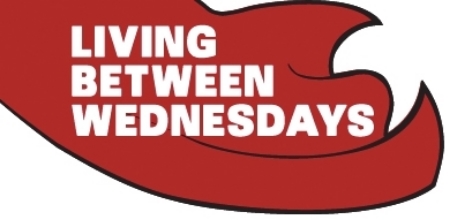

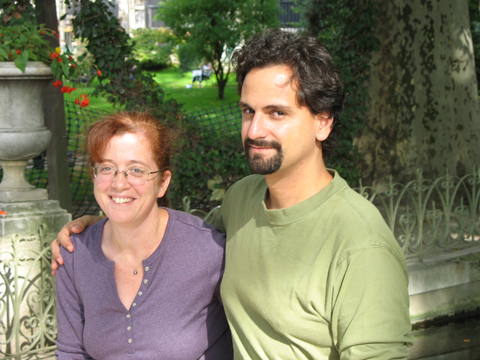
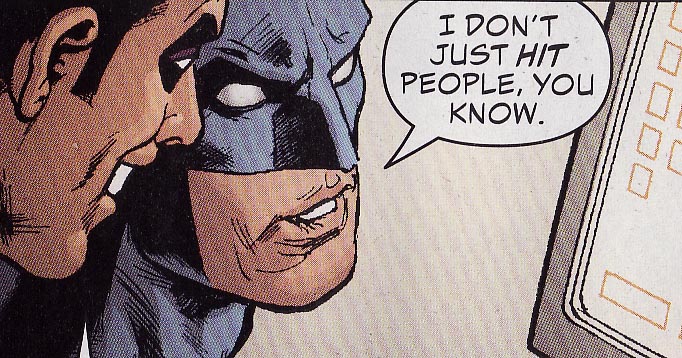
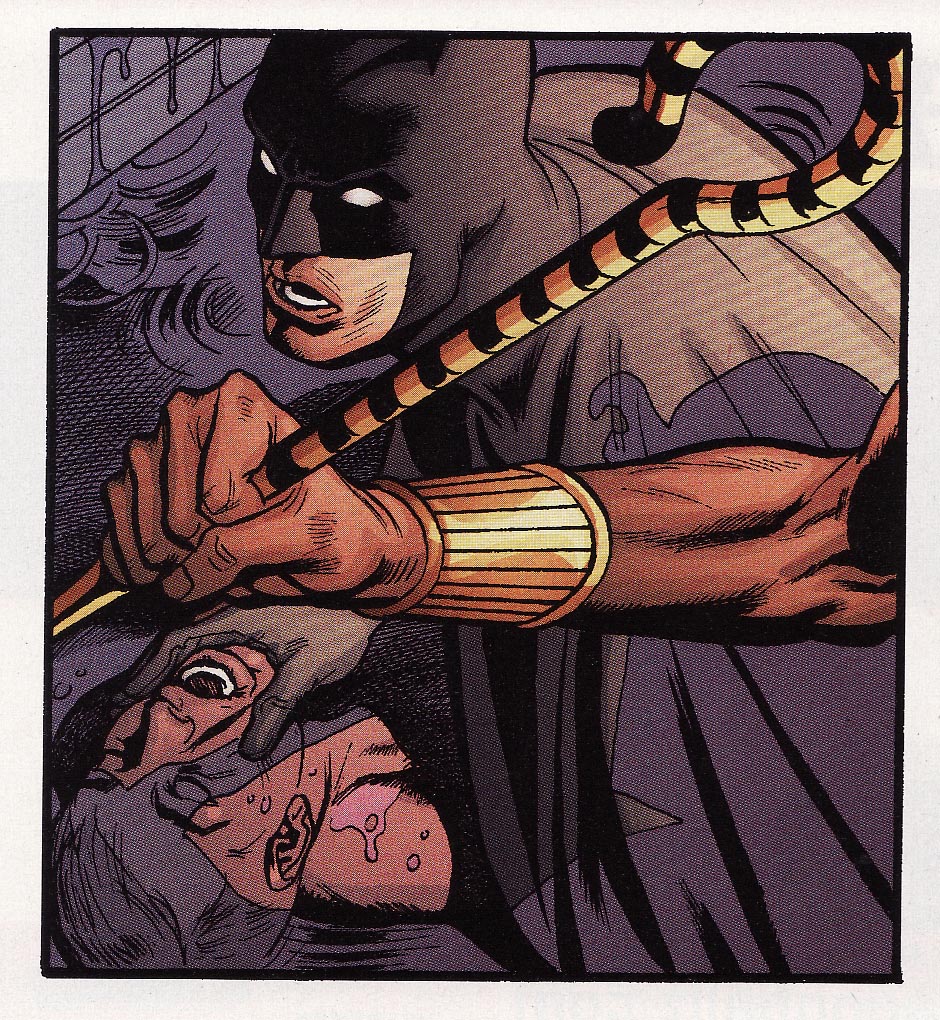
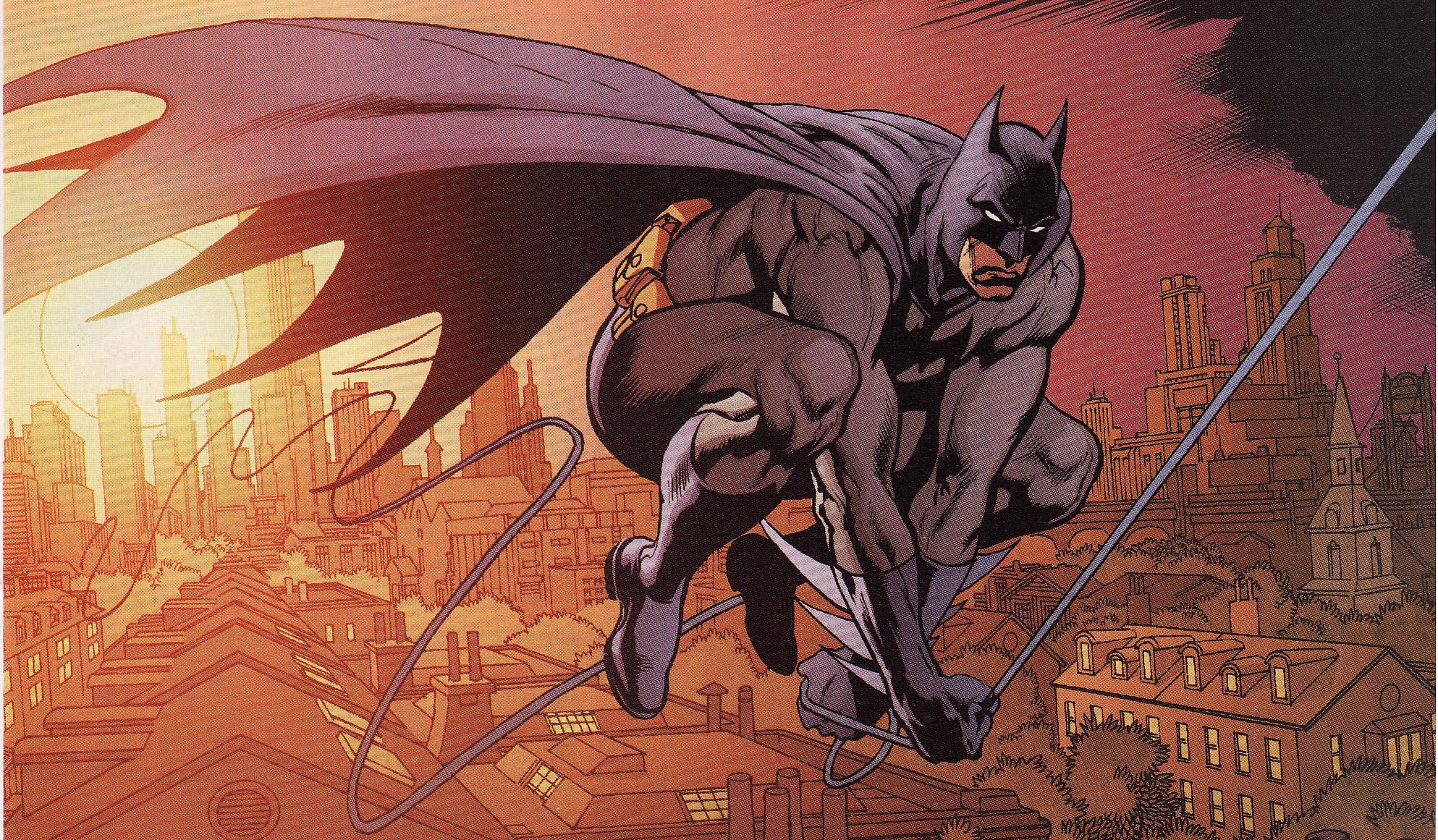
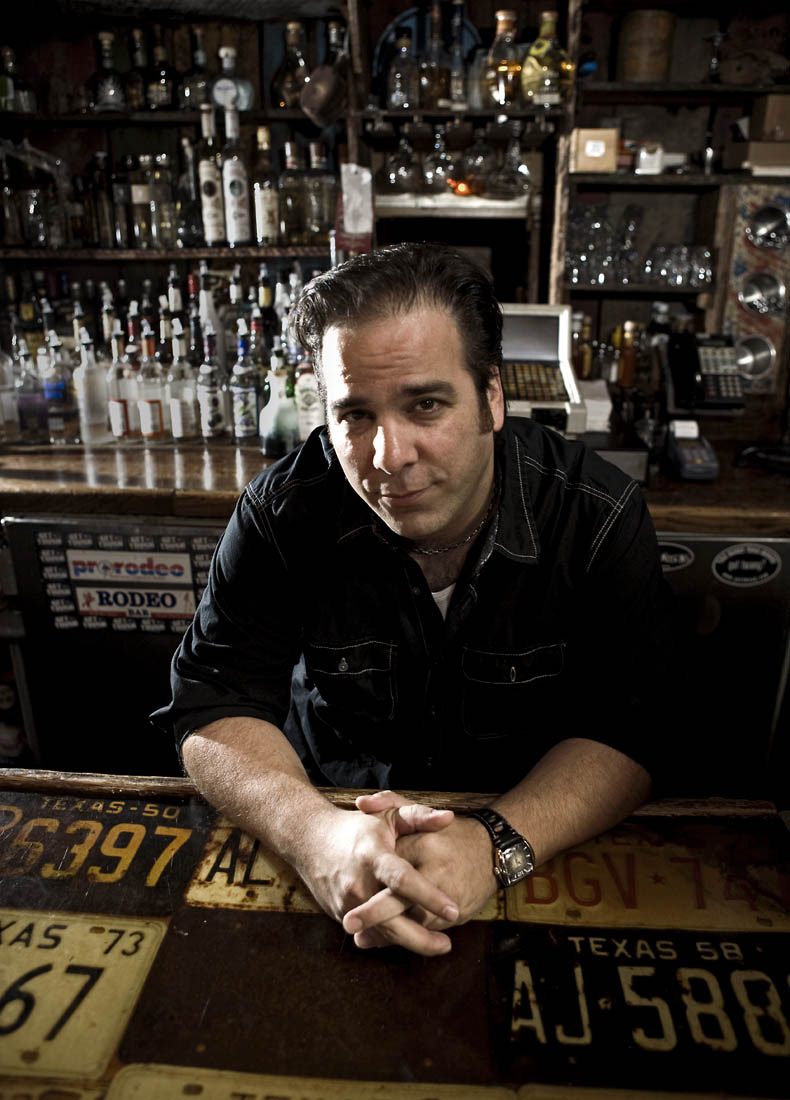 We kick off this exciting new series with one of my very favourite writers/artists, Jimmy Palmiotti! As you probably know, Jimmy and his writing partner Justin Gray write a lot of comics together, including the recent mini-series Terra, Superman/Supergirl: Maelstrom, and the amazing ongoing series Jonah Hex. He also writes a very entertaining
We kick off this exciting new series with one of my very favourite writers/artists, Jimmy Palmiotti! As you probably know, Jimmy and his writing partner Justin Gray write a lot of comics together, including the recent mini-series Terra, Superman/Supergirl: Maelstrom, and the amazing ongoing series Jonah Hex. He also writes a very entertaining 
 5. In the latest issue (#42) we're going to see a bit of Jonah Hex's childhood. Can I assume it was a happy one?
5. In the latest issue (#42) we're going to see a bit of Jonah Hex's childhood. Can I assume it was a happy one? 

